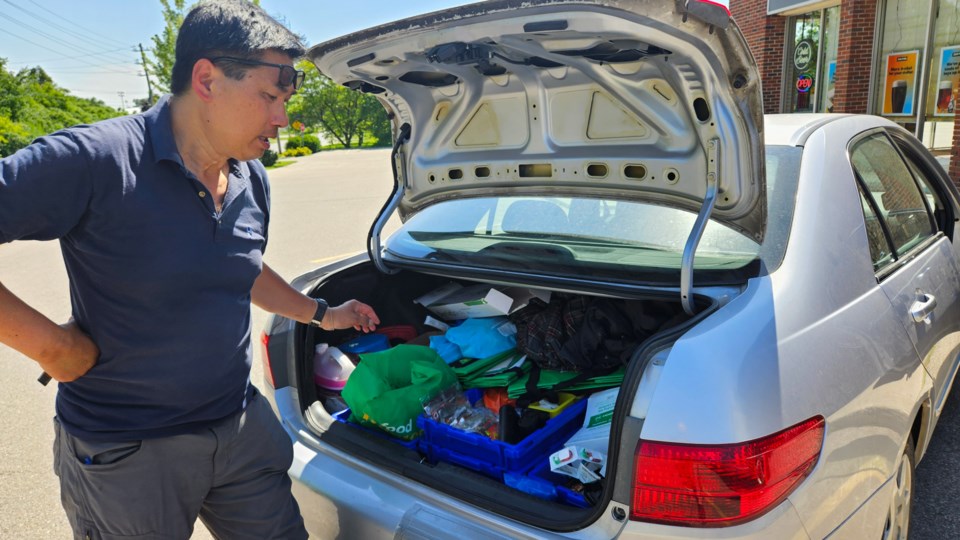He wakes up early every day and sets off to visit dozens of encampments throughout the city before starting his work day shortly after noon.
Along the way, Danny Lui delivers much-needed medicine and supplies to some of the city’s most vulnerable residents, in addition to warm greetings, friendly smiles and a genuine interest in their well-being.
“I feel very privileged all the time,” Danny said of how he feels making the rounds – something he does 365 days a year, no matter the weather, even if he feels ill. “You see how precariously people are living … (and) I want to help.”
Many of the encampments he visits are literally off the beaten path – hidden in wooded areas, down winding trails and steep embankments that would prove difficult for any sort of emergency response, should there be a medical emergency. Most involve tents of various sizes, though some include structures built out of scavenged materials.
Danny, a pharmacist with 42 years experience, has been making daily rounds since 2019 when he first got involved with the Safer Supply program through the Guelph Community Health Centre. Initially there were only a few recipients throughout the city who had difficulty getting to the designated dispersal point regularly and on time, so he decided the best thing to do was to make home visits.
The number of program participants has grown since then, and Danny’s visits go far beyond that initial purpose. He stops by with daily doses of medicine for whatever ailments people may have – as he explained, medicines can be easily misplaced, can be stolen or require refrigeration, and people sometimes have issues remembering to take them – along with water, food (mostly non-perishable) and wound care, if needed.
He’s not paid for his time, though many of the supplies he hands out come from local agencies and organizations offering assistance to people in need.

Danny also delivers compassion for the people he serves, asking about the structures they’re building, how their sleep has been, discussing what they’ve eaten, how they’re adjusting to seasonal or other changes, their latest activities, how their pets are doing and more.
The pharmacist knows each of the people he visits by name (also their pets’ names), and they know his name too. During a tour of encampment sites with GuelphToday, he was often greeted with big smiles and welcoming words.
“He saved my life. To be honest, I wouldn't be here if it wasn't for him,” Barbara Cunningham, who has lived in an encampment in the woods near Cutten Fields golf course “on and off” for about three years, said of Danny, adding, "it's hard for me to talk about.
“He's my best friend,” she added with a smile, noting she looks forward to him stopping by each morning.
Danny is quick to point out he’s far from the only one who visits the various encampments providing care – there’s a whole team of agency workers who strive to meet people's needs to the best of their ability.
“Everyone has their part to play,” he said.
Danny is one of several community members behind the Guelph Tiny Homes Coalition, which proposes to establish a group of 25 to 50 tiny homes, with shared kitchen, washroom and laundry areas, along with the provision of health, mental health and other wrap-around services residents may need.
“It’s not just a tiny house, it’s a tiny home,” he said, explaining he joined the coalition without hesitation after learning of its goal to help fill a gap in the housing continuum.
“You get running water, a bathroom … some autonomy,” Danny continued, explaining that when people don’t need to worry about shelter, safety or where their next meal is coming from, they can concentrate on taking steps to improve their situation.
Officials at the County of Wellington, which oversees social service and housing programs on behalf of the City of Guelph as well as the seven towns and townships that make up the county, are currently reviewing that proposal and how, if at all, the county and city can support it.
The findings of that review are set to be presented to Guelph city council during a special meeting on July 16.
“I know we can be a handful but if we had a home, a lot of our issues would be easier to deal with,” Cunningham suggested, noting the concept of a tiny village is something she’s advocated for during the past several years. “We don't have to worry about if we're gonna eat tonight. We don't have to watch our stuff 24 hours a day, every day.”
Arthur Gastia, who has lived in a wooded area off York Road near the Guelph Airpark for the past six years, said he isn’t personally interested in joining a community of tiny homes, but he knows many who are.
“I just want a place on my own and try to move on,” he said of why he wouldn’t personally want to be involved.
Asked what he’d say to people who stand against the idea, he said, “come over here with me for just two nights and they'll know how important the little houses will be.”
Danny stresses the importance of treating encampment residents with respect – something he firmly believes they often don’t get enough of.
“I ask myself, ‘How do I help them on their journey, but not take over the journey?” he said. “You're walking with them, not against them.”
